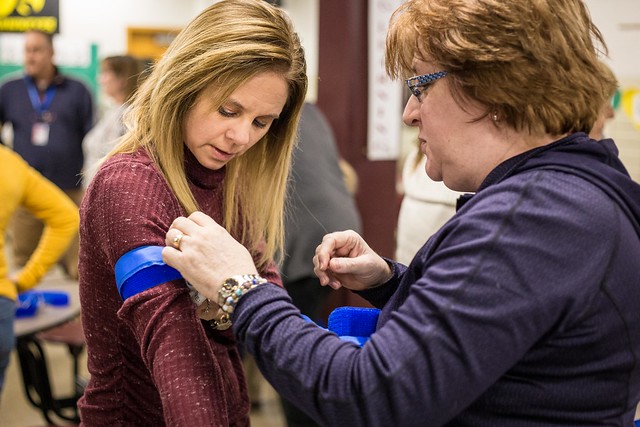With more than 33,000 students born in a hundred different nations, Des Moines Public Schools prides itself on being not only Iowa’s largest provider of education, but also its most diverse.
That diversity was reflected in a different way on February 19.
While students didn’t have classes, teachers and other members of the DMPS staff took part in Educator University, a full day of learning that covered issues ranging from the latest in classroom technology to enhanced student safety.
“Educator University allows teachers and other school district professionals the opportunity to design and plan their own professional development that focuses on the priorities at DMPS: student health and wellbeing, equity, the instructional framework, standards referenced grading and our Schools for Rigor work,” said Brenda Edmundson-Colby, Chief of Academics at DMPS.
We hopscotched around the district for a sampling of some of the offerings.
A conference room at Scavo High School was the site for a morning primer session on Canvas. No, not the stuff of tents, sails and oil paintings.
“Canvas was adopted as our district Learning Management System in June of 2017,” said DMPS Instructional Design Manager Sarah Dougherty.
An LMS is a web-based platform used to plan and deliver instruction and provide assessments and feedback. All DMPS teachers have access to Canvas and can use it as a tool in their classrooms. Canvas Cafes are offered the first Tuesday of every month for tech support and the system is steadily growing in popularity. Dougherty supplied some metrics compiled since last summer to illustrate that fact:
- 325 active courses
- 2,578 active students
- 6,455 assignments submitted
- 3,617 discussion topics
- 17,595 files uploaded
- 447 media recordings
At this rate, binders and ballpoints will be things of the past in the not too distant future.
Downtown at the district’s Center for New Americans the district’s team of bilingual family liaisons attended a series of training workshops. We dropped in for one on the growing problem of human trafficking, aka, 21st century slavery.
Shannon Schott is a Lead Program Specialist for Teens Against Human Trafficking, a subsidiary of Youth Shelter Services that is active in more than 100 schools statewide. Her presentation included signs to look for that might indicate a teenager is being victimized. Especially vulnerable are minors living in poverty, and the Des Moines area is home to too many who fit that profile. In 2017 the average age for a victim of the multibillion dollar (and still growing) human trafficking industry was just 15.
“Trafficking takes two forms,” Schott said. “Sexual services (prostitution, pornography or stripping) or labor. Poor families sometimes traffic their own children out of desperation.”
Schott listed the following warning signs that school personnel should learn to recognize:
- Sudden changes in attire, behavior, relationships, or possessions (e.g., has expensive items)
- Misses school on a regular basis and/or has unexplained absences
- Carrying more than one cell phone
- Picked up by different people every day after school
- Falling asleep in class regularly
- Frequently runs away from home
- Makes references to frequent travel to other cities or towns
- Shows signs of drug addiction and/or physical abuse
- Has coached/rehearsed responses to questions
- Is uncharacteristically promiscuous and/or makes references to sexual situations that are beyond age-specific norms
- Has a “boyfriend” or a “girlfriend” who is noticeably older
Another workshop dealing with student safety took place at Lincoln RAILS Academy where school nurses practiced how to respond to traumatic events, an even more timely topic in light of last week’s tragic mass shooting at a high school in Florida.
Diane Gladson, the district’s Health Services Supervisor, organized a Stop the Bleed training session as part of a nationwide effort to help turn bystanders into first responders during a mass casualty incident, and help avoid preventable deaths. After a presentation in the auditorium, participants headed to the cafeteria to practice basic tourniquets.
“Through the training, we can come together to teach people in a traumatic situation how to help others even while this chaos is going on,” Gladson said. She noted that DMPS is working with community partners, including Unity Point and Mercy hospitals, to continue training and expand the initiative throughout the school district.






